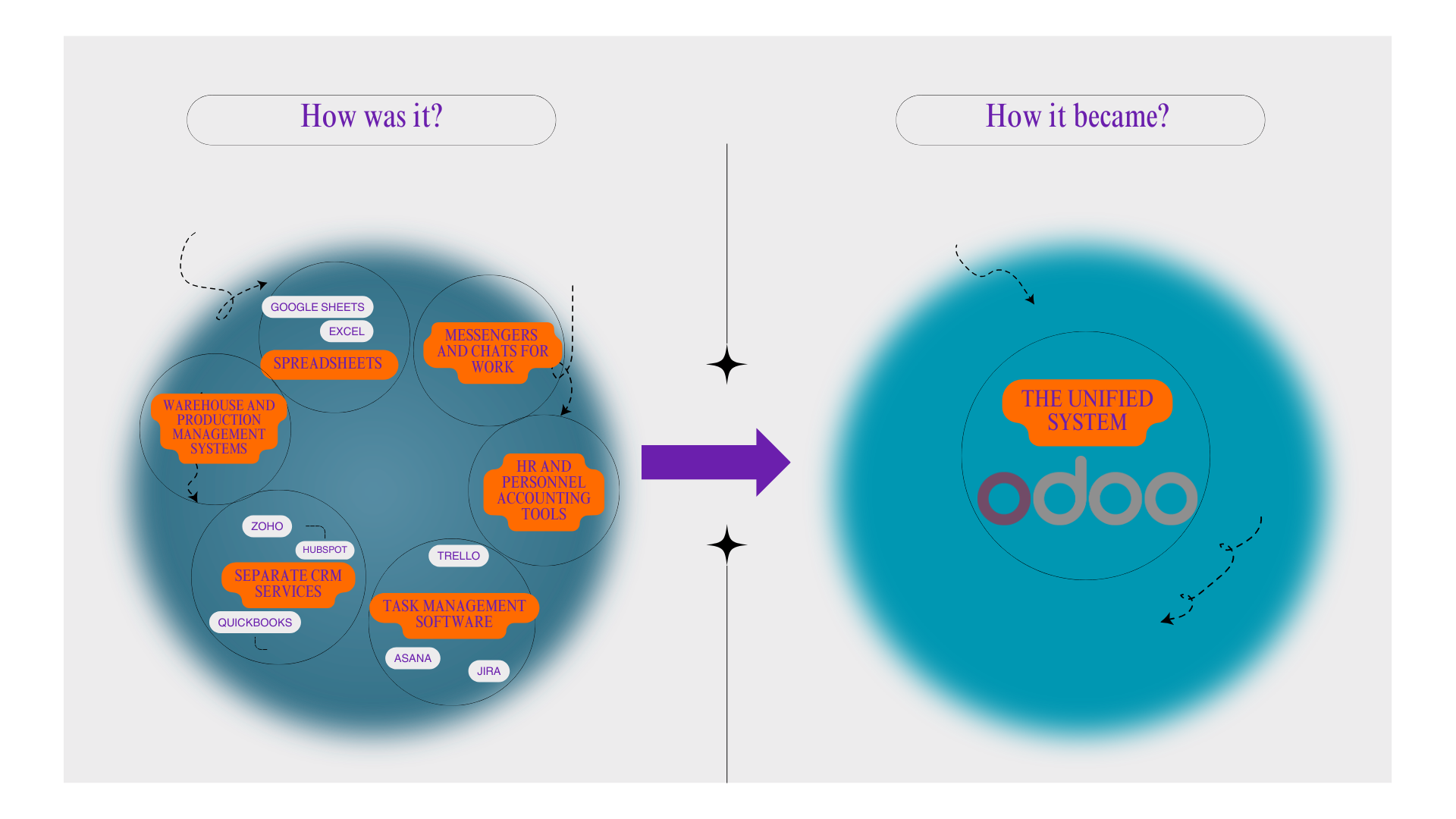Internal digital transformation modernizes a company's business processes through modern management systems. In a fast-paced market, the effective use of ERP, CRM, analytics, and automation is key to productivity and competitiveness.
Imagine that instead of spreadsheets, separate CRM, accounting programs, online services, and messengers, you had one universal tool. Instead of dozens of separate applications, you get a centralized system where all data is interconnected and available in real time. How? Read all the details below in the article.
Synergy of tools and team
Modern business management tools increase team productivity by automating individual processes. Centralized data storage and department integration help avoid mistakes and quickly obtain the necessary information, allowing you to focus on strategically important tasks.
Services also improve communication and transparency within the company, as a clear distribution of tasks and understandable priorities help the team work in unison, respond quickly to changes, and achieve goals. However, using a large number of disparate tools often leads to chaos, duplication of work, and reduced efficiency.
According to ITPro.com, the prevalence of a large number of tools is one of the main problems teams face. The main challenge is that switching between different environments or sets of solutions in daily work negatively affects performance. According to the survey, 70% said that constantly switching between tools reduces their productivity.
An ERP system, such as Odoo, helps to consolidate all these tools into a single platform.
What tools can Odoo replace?
- Spreadsheets (Excel, Google Sheets) — no more need to keep separate documents for sales, inventory, or finance. Odoo automatically consolidates data and generates reports.
- Separate CRM services — all contacts, leads, deals, and customer interactions are managed directly in the system. There is no need to transfer data between CRM and other programs.
- Accounting programs and online services — finances, accounts, payments, and taxes can be controlled directly in Odoo. Reports are generated automatically, and integration with banks simplifies the control of cash flow.
- Project and task management software (Trello, Asana, Jira) – planning, task monitoring, and team coordination take place within the platform.
- Messengers and internal chats for work processes. Odoo integrates communication within projects and tasks, reducing information noise and data loss.
- Warehouse and production management systems – control of inventory, orders, production processes, and logistics is transferred to a single system, which reduces errors and simplifies reporting.
- HR and personnel accounting tools – from recruiting and personnel file management to working time and payroll accounting.
The key effect is smooth business operation. All data is collected in one place, each department sees up-to-date information, and management gets the full picture without constantly having to “stitch together” tables and reports from different sources.

Advantages of a unified system
- Single source of truth. All departments work with up-to-date and consistent data.
- Fast decision-making. Information is available in real time, allowing management to respond quickly to changes, plan, and adjust strategy.
- Less manual work and fewer errors. Process automation reduces the amount of manual data entry and the risk of errors that arise when duplicating information.
- Cost savings. There is no need to purchase and maintain dozens of different services. A single system reduces the cost of licenses, integration, and technical support.
- Transparency and control. The owner or top manager sees the full picture of the business — from finances and sales to inventory and task execution — without having to collect data from different sources.
- Scalability. Odoo can be customized and expanded to new areas, markets, or increased workloads without losing efficiency.
In addition to the obvious advantages, universal systems help to adapt more quickly to new market conditions and experiment with processes without additional costs for integrating new tools.
Final thoughts
Implementing Odoo transforms the chaos of tools into a single, centralized platform. Companies that implement such solutions not only optimize their internal processes but also gain the ability to form a more flexible, adaptive, and transparent organizational culture that is ready for any challenges.
Without integrating such tools, a company risks falling behind its competitors, spending more time on routine tasks, and losing opportunities for scaling.
Don't delay and find out how you can automate your business and increase your profits.